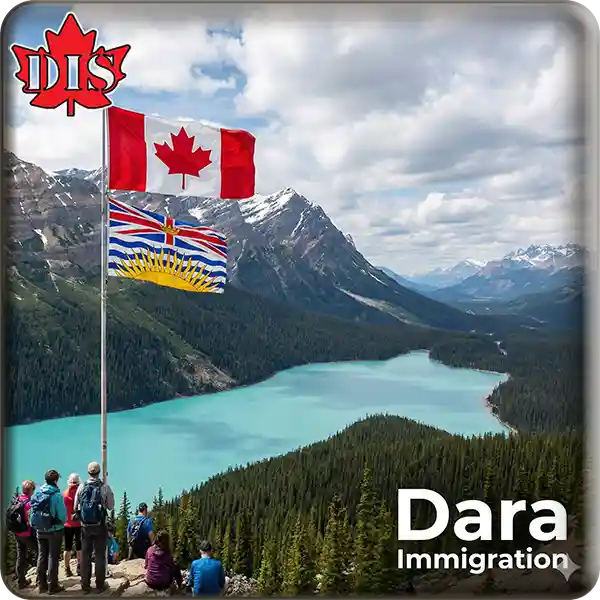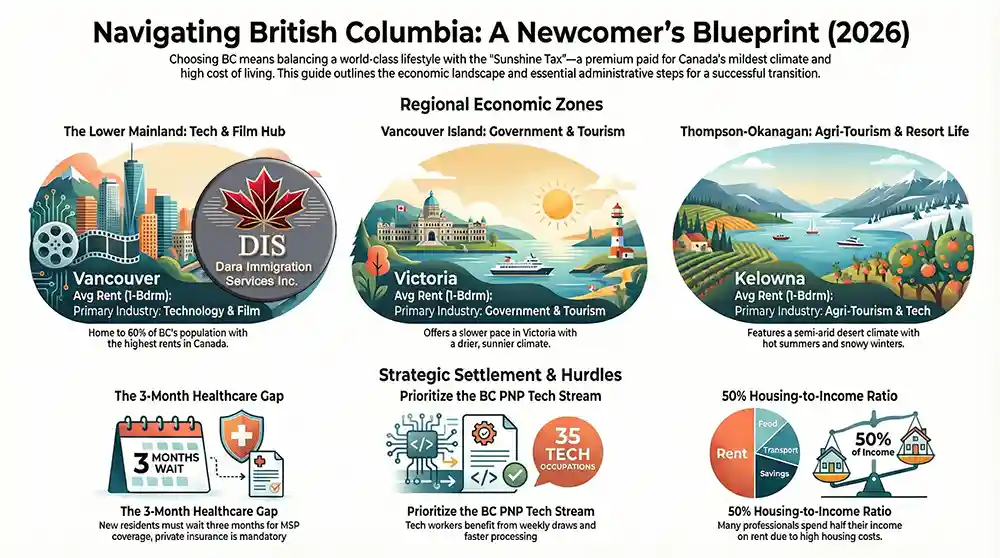British Columbia
British Columbia Overview 2026-2027
To choose British Columbia is to choose a life defined by breathtaking natural beauty, a mild coastal climate, and a dynamic economy tied to the Pacific Rim. For the thousands of newcomers arriving in 2026, the province represents the ideal blend of career ambition and lifestyle balance, often referred to as the “West Coast” way of life.

However, settling in British Columbia comes with a significant price tag. The “Sunshine Tax”—the premium paid to live in Canada’s mildest region—means housing and daily costs are among the highest in the country. Success here requires a strategic understanding of the BC Provincial Nominee Program (BC PNP), particularly its priority streams for Tech and Healthcare.
At Dara Immigration Services, we help you navigate the competitive landscape of the West. This guide is your blueprint to settling in British Columbia successfully, ensuring your move aligns with your financial and professional goals.
British Columbia Overview: Economy & Lifestyle
British Columbia is Canada’s westernmost province, serving as the country’s trade hub with Asia and the United States. Its economy is diverse, shifting from resource extraction (forestry, mining) in the north to a sophisticated technology and film sector in the south.
For immigrants, it is crucial to understand that BC is geographically divided. The lifestyle in the metropolitan Lower Mainland (Vancouver) is vastly different from the resource-driven Northern BC or the retirement-friendly Vancouver Island.
Quick Facts: British Columbia at a Glance
- Capital City: Victoria.
- Largest City: Vancouver (Population ~2.8 Million in Metro).
- Population: Approx. 5.7 Million (2026 Estimate).
- Taxation: 5% Federal GST + 7% Provincial PST.
- Key Immigration Stream: BC PNP (Tech, Healthcare, Childcare).
- Minimum Wage: $17.40+ per hour (Indexed to inflation).
Major Economic Zones in British Columbia
To succeed in British Columbia, you must target the region that aligns with your industry and budget.
The Lower Mainland (Vancouver & Surrey)
Home to 60% of the province’s population, this is the cultural and economic heart of BC.
Vancouver & Surrey
- Economy & Labour Market: A global hub for Technology (“Silicon Valley North”), Film & Television production, and International Trade.
- Lifestyle & Culture: Highly multicultural and urban. Residents prioritize wellness, outdoor recreation (yoga, hiking), and diverse culinary experiences.
- Climate Profile: The mildest in Canada. Winters are rainy and gray (4°C) but snow is rare. Summers are warm and dry (22°C).
- Cost of Living: Extremely High. One-bedroom rents in Vancouver average $2,896, the highest in Canada. Surrey offers slightly lower rents but requires a commute.
Vancouver Island (Victoria & Nanaimo)
Separated from the mainland by a ferry ride, the island moves at a slower, more relaxed pace.
Victoria
- Economy & Labour Market: Dominated by the Public Sector (Provincial Government), Tourism, and a growing Tech sector.
- Lifestyle & Culture: Historic and “British” in feel. It is a popular destination for retirees and families seeking a quieter life.
- Climate Profile: Similar to Vancouver but significantly drier and sunnier due to the rain shadow effect.
- Cost of Living: High. Vacancy rates are critically low. Rents in Victoria average $2,300+, rivaling major global cities.
The Thompson-Okanagan (Kelowna)
Located in the interior, this region is famous for its wineries, lakes, and hot summers.
Kelowna
- Economy & Labour Market: Agriculture (Wine/Fruit), Tourism, and an emerging Tech hub supported by the “OKGN Tech” community.
- Lifestyle & Culture: A resort-style life. Summers are spent on Okanagan Lake; winters are spent at nearby ski resorts like Big White.
- Climate Profile: A semi-arid desert climate. Summers are hot (30°C+), and winters are colder and snowier than the coast (-5°C).
- Cost of Living: Moderate to High. Rents average $1,900, having risen sharply due to internal migration from Vancouver.
Cost of Living & Climate (2026)
Use this table to determine which BC region fits your budget.
| City / Region | Avg Rent (1-Bdrm) | Key Industry | Avg Winter Low (Jan) | Notes |
| Vancouver | ~$2,896 | Tech / Film | +3°C | Global Tech Hub |
| Victoria | ~$2,350 | Gov / Tourism | +4°C | Provincial Capital |
| Kelowna | ~$1,950 | Agri-Tourism | -4°C | Fast-growing Tech |
| Prince George | ~$1,450 | Forestry / Health | -10°C | Affordable Housing |
| Surrey | ~$2,100 | Construction / Trade | +3°C | High Immigrant Pop. |
Note: Rents are 2026 market estimates. Prince George offers the “Rural & Northern” immigration advantage.
“How-To” Guide: Settling in BC
Your transition to British Columbia involves specific administrative hurdles unique to the province.
Pre-Arrival: Strategic Planning
- Check BC PNP Tech: If you work in one of the 35 priority tech occupations, you may qualify for weekly draws and faster processing.
- Budget for the Wait: BC requires a 3-month wait for healthcare. You must budget $300-$500 for private health insurance for this gap.
Your First Week: Essential Setup
- Apply for MSP: Register for the Medical Services Plan (MSP) immediately. Coverage begins on the first day of the third month after arrival.
- Get a Compass Card: If in Vancouver, buy a Compass Card for the TransLink transit system (SkyTrain/Bus/SeaBus).
- Visit ICBC: You have 90 days to swap your driver’s license. Book an appointment with the Insurance Corporation of British Columbia (ICBC) early.
Long-Term: Housing & Status
- Secure Housing: Be prepared to provide references and a credit check. In competitive markets like Vancouver, have your deposit ready immediately.
- File Taxes: To access the BC Family Benefit and other provincial credits, you must file an annual tax return.
Challenges for Newcomers in British Columbia
To succeed in British Columbia, you must be realistic about the costs.
Challenge #1: Housing Affordability
- The Reality: Housing costs have outpaced wages. Many professionals spend 50% of their income on rent. Buying a detached home in Vancouver is out of reach for most average earners (avg price $2M+).
- The Strategy: Embrace high-density living (condos) or consider satellite cities like Langley, Coquitlam, or Nanaimo where prices are more attainable.
Challenge #2: The Healthcare Wait
- The Reality: Unlike Alberta, BC forces new residents to wait roughly 3 months for public health coverage.
- The Strategy: Do not travel without private insurance. A single emergency room visit during the waiting period can cost thousands of dollars.
Frequently Asked Questions (FAQ)
- Is healthcare free in British Columbia?
No. While there are no premiums for most residents, international students and some temporary workers must pay a monthly health fee (approx. $75/month). Additionally, there is a mandatory 3-month waiting period for coverage to begin.
- What is the “BC PNP Tech” stream?
This is a specialized immigration pathway for workers in 35 key technology occupations (e.g., software engineers, graphic designers). It offers weekly draws and priority processing, making it one of the fastest ways to get Permanent Residence in Canada.
- Does it rain all the time in BC?
Only on the coast (Vancouver/Victoria) during the winter months (November to April). The summers are dry and sunny. The interior of BC (Kelowna/Kamloops) has a completely different climate with hot summers and snowy winters.
- Do I need a car in Vancouver?
Not necessarily. Vancouver has an excellent public transit system (SkyTrain, SeaBus, and buses). However, if you plan to explore the mountains or live in the suburbs (like Langley or Delta), a car becomes essential.
- What is the “Sunshine Tax”?
This is a local term referring to the lower wages and higher cost of living in BC compared to other provinces. People accept this financial trade-off for the privilege of enjoying the mild climate and stunning natural environment.

Professional Immigration Assistance
British Columbia is a highly competitive destination. The BC PNP is points-based and selective, favoring those with high English scores, specific job offers, and regional experience. A generic application often results in rejection.
Ensure your West Coast dream becomes a reality. Contact Dara Immigration Services today to optimize your profile for the BC PNP.
Disclaimer: This article provides general information regarding settlement and immigration in British Columbia. It does not constitute legal advice.
Download:
Download this bulletin of British Columbia as a PDF.
Download “British-Columbia-Bulletin-2026-2027.pdf” British-Columbia-Bulletin-2026-2027.pdf – Downloaded 30 times – 1.60 MB